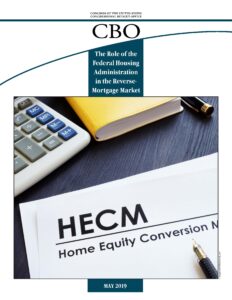 The Federal Housing Administration’s (FHA’s) Home Equity Conversion Mortgage (HECM) program guarantees repayment on reverse mortgages made by private lenders. In this report, the Congressional Budget Office examines the program’s effects on the federal budget and options to reduce costs and risks to the government or borrowers.
The Federal Housing Administration’s (FHA’s) Home Equity Conversion Mortgage (HECM) program guarantees repayment on reverse mortgages made by private lenders. In this report, the Congressional Budget Office examines the program’s effects on the federal budget and options to reduce costs and risks to the government or borrowers.
• Reverse-Mortgage Basics. A reverse mortgage lets older homeowners convert equity in their home into payments while they reside in the home. For a reverse mortgage guaranteed by FHA (called a HECM), if proceeds from the home’s eventual sale cannot fully repay the loan, FHA covers the shortfall. FHA’s costs are offset by the guarantee fees it charges and the interest it earns on HECMs sold to it by lenders.
• Budgetary Effects. Under the accounting rules of the Federal Credit Reform Act of 1990 (FCRA), the new HECMs that FHA is projected to guarantee in 2020 would decrease the budget deficit by a small amount, CBO estimates. Under fair-value accounting—in which estimates of costs are based on the market value of the government’s obligations—that 2020 cohort of HECMs would increase the deficit by $350 million.
• Options. CBO analyzed four approaches for altering the HECM program: converting it to a federal direct loan program, reducing the amount that FHA guarantees to repay lenders, sharing the risk of losses with lenders, and slowing the growth of funds available to borrowers who do not draw
their loan’s full amount initially.